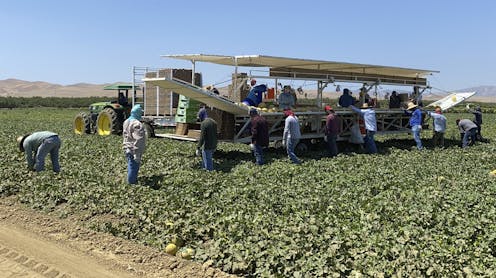Providing farmworkers with health insurance is worth it for their employers − new research
- Written by John Lowrey, Assistant Professor of Supply Chain and Health Sciences, Northeastern University

Agricultural employers who provide farmworkers with health insurance earn higher profits, even after accounting for the cost of that coverage. In addition, farmworkers who get health insurance through their employers are more productive and earn more money than those who do not.
These are the key findings from our study[1] published in the March 2025 issue of the American Journal of Agricultural Economics.
To conduct this research, we crunched over three decades of data from the Labor Department’s National Agricultural Workers Survey[2]. We focused on California, the nation’s largest producer[3] of fruits, nuts and other labor-intensive agricultural products in the U.S., from 1989 to 2022.
We determined that if 20% more farmworkers got health insurance coverage, they would have earned $23,063 a year in 2022, up from $22,482 if they did not. Their employers, meanwhile, would earn $7,303 in net profits per worker annually in this same scenario, versus $6,598.
Why it matters
Roughly half of California’s agricultural employers are facing labor shortages[4] at a time when the average age of U.S. farmworkers is also rising[5].
Some of them, including grape producers, are responding by investing more heavily in labor-saving equipment[6], which helps reduce the need for seasonal manual labor. However, automated harvesting isn’t yet a viable or affordable option for labor-intensive specialty crops such as melons and strawberries[7].
Despite labor shortages, agricultural employers may be reluctant to increase total compensation for farmworkers. They may also be wary of providing additional benefits such as health insurance for two main reasons.
First, seasonal workers are, by definition, transient, meaning that the employer who provides coverage may not necessarily be the same one who benefits from a healthier worker. Second, it costs an employer money but doesn’t necessarily benefit them in the future if the worker moves on.
Most U.S. farmworkers are immigrants from Mexico[8] or Central America. Roughly 42% are immigrants who are in the U.S. without legal authorization[9], down from 55% in the early 2000s.
As the share of farmworkers who are unauthorized immigrants has declined, the share who are U.S. citizens – including those born here – has grown and now stands at about 39%.
The low wages farmworkers earn[10] offer little incentive for more U.S. citizens and permanent residents to take these jobs. These jobs might become more attractive if employers offered health care coverage to protect the health of the worker and their household.
Farmworkers who lack legal authorization to be in the U.S. are not eligible for private health insurance policies[11], and many can’t enroll in Medicaid[12], a government-run health insurance program that’s primarily for low-income Americans and people with disabilities. Regardless, some employers do take steps to help them gain access to health care services. As of 2025, a large share of farmworkers remain uninsured[13], including many citizens and immigrants with legal status.
Limited access to health care is an unfortunate reality for farmworkers, whose jobs are physically demanding and dangerous. In addition, farmworkers are paid at or near the minimum wage and are constantly searching for their next employment opportunity. This uncertainty causes high levels of stress[14], which can contribute to chronic health issues such as hypertension.
What still isn’t known
It is hard to estimate the effect of employer-provided health insurance on workers and employers, since labor market outcomes are a result of highly complex interactions.
For example, wages, productivity and how long someone keeps their job are highly interdependent variables determined by the interaction between what workers seek and what employers offer. And wages do not always reflect a worker’s skills and abilities, as some people are more willing to accept a job with low pay if their compensation includes good benefits such as health insurance.
The Research Brief[15] is a short take about interesting academic work.
References
- ^ key findings from our study (doi.org)
- ^ National Agricultural Workers Survey (www.dol.gov)
- ^ nation’s largest producer (www.cdfa.ca.gov)
- ^ half of California’s agricultural employers are facing labor shortages (ageconsearch.umn.edu)
- ^ average age of U.S. farmworkers is also rising (www.ers.usda.gov)
- ^ investing more heavily in labor-saving equipment (www.ucdavis.edu)
- ^ labor-intensive specialty crops such as melons and strawberries (www.mrfimpacts.org)
- ^ immigrants from Mexico (www.ers.usda.gov)
- ^ in the U.S. without legal authorization (www.ers.usda.gov)
- ^ low wages farmworkers earn (www.epi.org)
- ^ health insurance policies (extension.psu.edu)
- ^ can’t enroll in Medicaid (www.kff.org)
- ^ remain uninsured (www.ers.usda.gov)
- ^ high levels of stress (doi.org)
- ^ Research Brief (theconversation.com)







